The Audubon Observer, February 2020
|
|
||||
DUVAL AUDUBON SOCIETY'S BLUEBIRD TRAIL
This year Laura is taking a much deserved break. Charlene West, who lives in the area of the boxes, will be monitoring the bluebirds while Laura is away. Just a reminder that now is the time to make sure your bluebird nest boxes are clean and solid or to install new boxes to be ready for this year’s birds. Audubon.org has an entire section devoted to bluebirds, their nesting habits, and step-by-step instructions for building a bluebird nest box. Nesting is expected to start in mid-March. --Carolyn Antman, Conservation Chair, Duval County DISCARDED FISHING LINE A GRAVE THREAT TO WILDLIFE Duval Audubon Society member Shane Carroll recently shared this remarkable story with us:
I knew I couldn't cross the 50 feet without getting stuck in the muck. Just then I noticed a young man walking through the reeds toward the bird. This young man slowly approached the bird, picked it up and started to unravel the fishing I had a pocket knife on me so I started the walk around the pond to the northern side where the young man and bird were located. It took about 10 minutes to get there and the bird had most of the fishing line removed by the time I got there. The young man said when he got to the bird the fishing line was attached to a hook and weight that were buried into the sand preventing the bird from moving more than a few feet.
Kudos to Alan and Shane for making the effort to free this innocent creature from what would assuredly have been a slow and miserable death. Audubon North Carolina estimates that "...more than 1 million shorebirds die every year as a result of marine debris. 320,000 of those deaths are said to be attributed to discarded fishing equipment, including lines and hooks." And not just birds: according to Audubon, "...littered line hurts marine recreation, too. It wreaks havoc on boaters’ propellers and along with birds and fish, can endanger scuba divers. A diver in South Carolina died a year ago after fishing line got caught in her breathing gear." Carelessly discarded fishing gear is literally a death trap for birds and other wildlife. Monofilament line is essentially invisible in the water, making it nearly impossible for wildlife to avoid. Not only that, but it takes centuries to biodegrade, continuing to pose life-threatening dangers to seabirds, marine mammals, sea turtles, and fishes.
If you like to fish, please dispose of used line responsibily. Cutting it so that it just falls into the water or onto the beach is guaranteed to maim or kill wildlife. Thank you for considering your impact on wildlife and the environment when you're enjoying all the outdoors has to offer. --Carol Bailey-White, Vice President NATIVE PLANTS FOR BIRDS: YAUPON HOLLY To help you create bird friendly habitat in your landscape, we are sharing a native plant every month that is beneficial to birds and pollinators. This month's plant is: Yaupon Holly (Ilex vomitoria)
It is the only known indigenous plant in North America which produces caffeine. The Native Americans brewed the leaves and stems to make a tea which they drank in great quantities for purification and unity rituals and fasted from food. These rituals induced vomiting which led the Europeans to incorrectly believe that the plant caused vomiting and that is how it got this Latin name. In small amounts, the dried leaves produce a pleasant tea which is now commercially available as well. For additional information on native plants for birds, check out Audubon's excellent Plants for Birds website: Audubon.org/plantsforbirds. For local sources of native plants, check with the Ixia Chapter of the Florida Native Plant Society. They often have native plants as well as cuttings available at their monthly meetings on the first Tuesday of each month. Check out their Events Calendar for all of their upcoming activities. --Jody Willis, President BOOK REVIEW
"The tall trees swayed in the wind and tickled the low clouds, sprinkling small snowflakes with each passing gust of wind. Staring at the aspen’s ivory fingers grasping at the patches of blue sky, my eyelids began to close..."
Christian met Andrew Guttenberg during his Big Year. When he decided to write Falcon Freeway, he invited Andrew to illustrate it. You can find Andrew’s wonderful artwork on The Birding Project or connect with him on Facebook. Christian, like many of us, is a longtime admirer of Kenn Kaufmann, and the title of his book is a tribute to Kenn’s book Kingbird Highway. If you were inspired by Kenn’s book, you will also love Falcon Freeway. Falcon Freeway is available on Christian’s website or Amazon. --Deb Kainauskas, Programs and Field Trips Chair UPCOMING EVENTS Our 2019/2020 season continues this month with more exciting activities. Please join us for one (or more) of our upcoming field trips or programs.
Please, always check our website for any last-minute changes before heading out the door, just in case something has come up. We hope to see you soon! Duval Audubon Society, Inc. |
||||

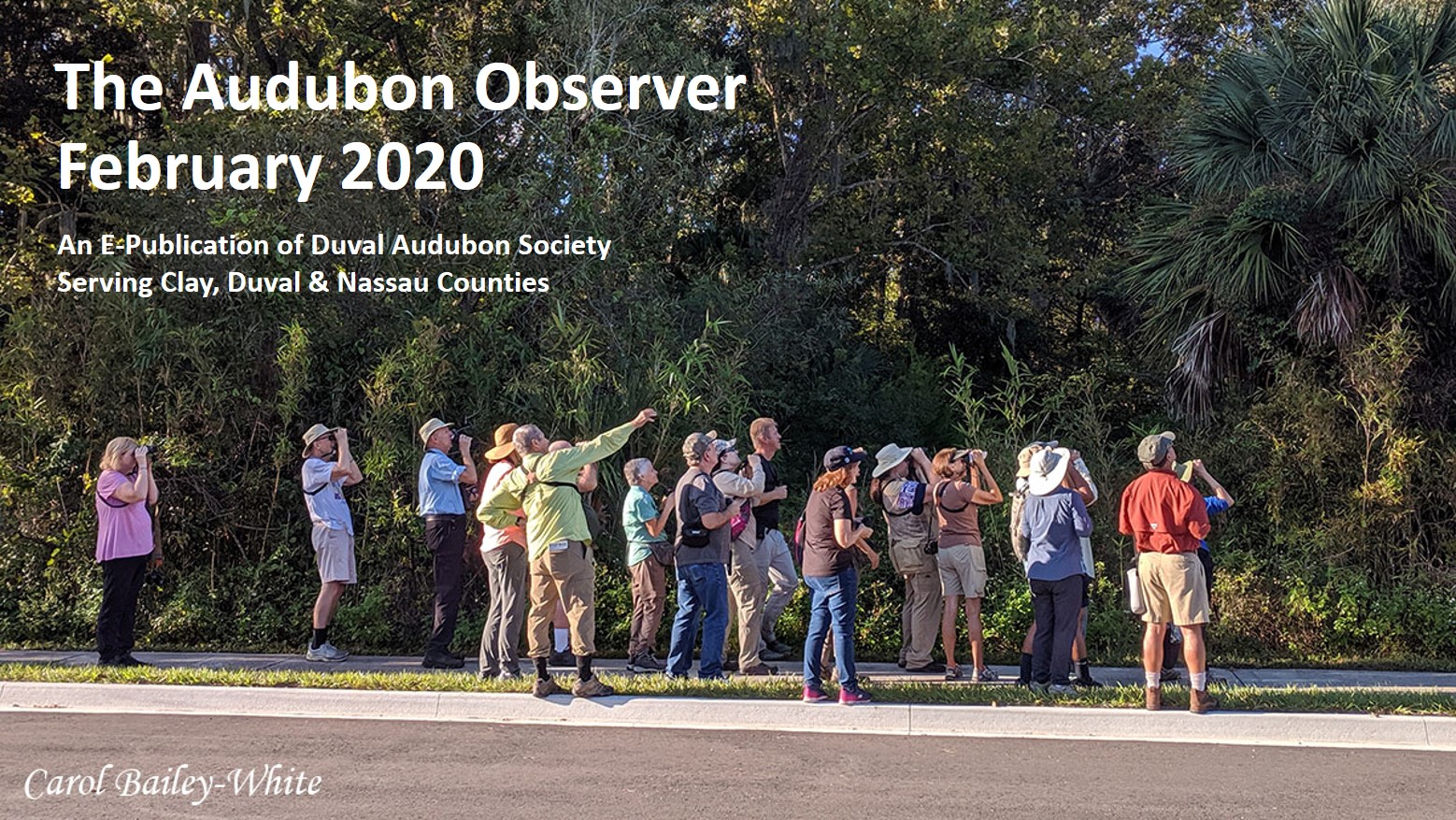
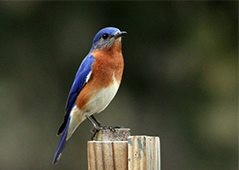
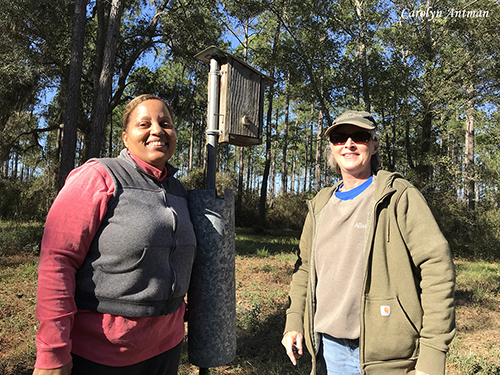 They are pictured at left (Laura in sunglasses) when they recently went out to show Charlene the ropes. Many thanks to Laura for her years of service and to Charlene for stepping up to the job.
They are pictured at left (Laura in sunglasses) when they recently went out to show Charlene the ropes. Many thanks to Laura for her years of service and to Charlene for stepping up to the job.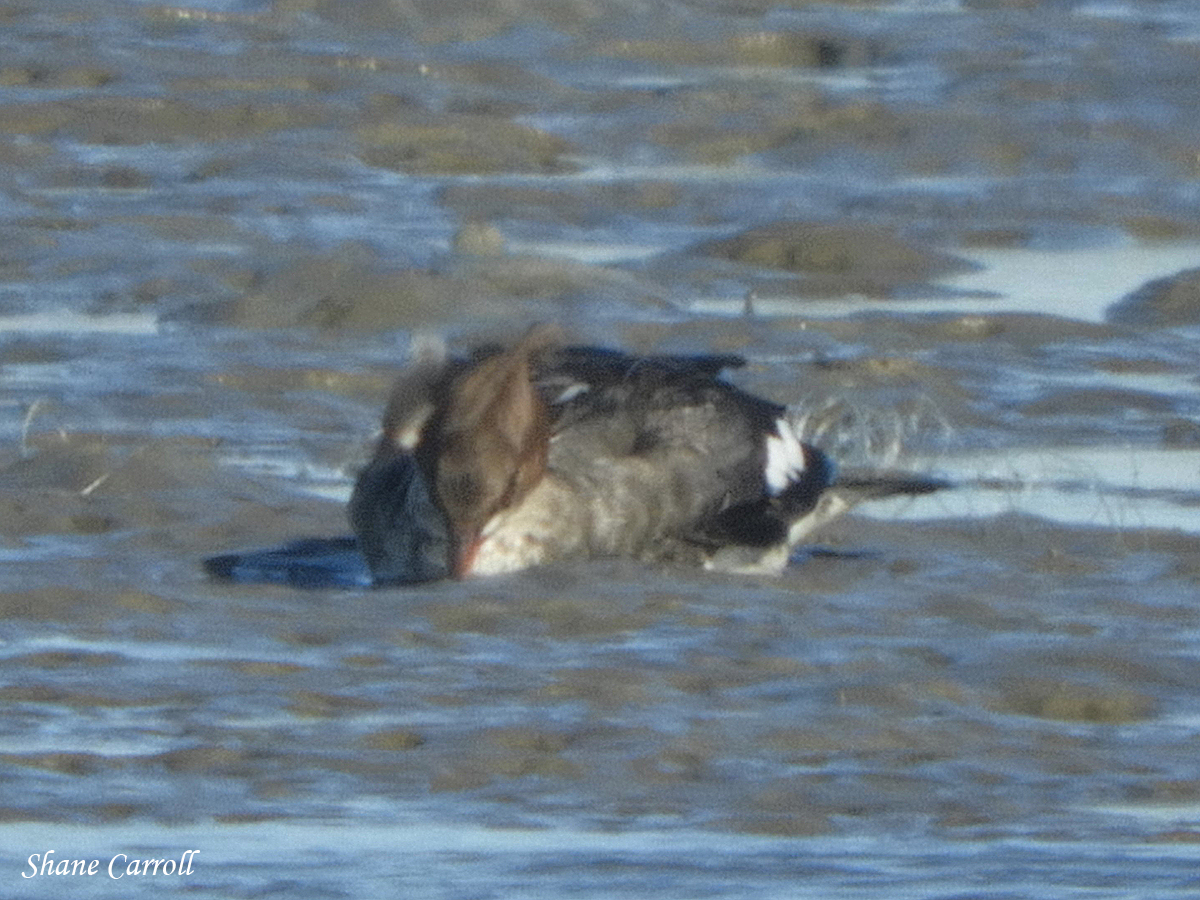 "Today I was at Huguenot Memorial Park at low tide. I was on the family beach and noted a Red-breasted Merganser just 50 feet across the pond on a sandbar. It seemed to be just sitting but then it struggled to stand. There were gulls approaching and agitating it. I set my binoculars on it to see that there was fishing line all tangled up around its bill, wings and neck.
"Today I was at Huguenot Memorial Park at low tide. I was on the family beach and noted a Red-breasted Merganser just 50 feet across the pond on a sandbar. It seemed to be just sitting but then it struggled to stand. There were gulls approaching and agitating it. I set my binoculars on it to see that there was fishing line all tangled up around its bill, wings and neck.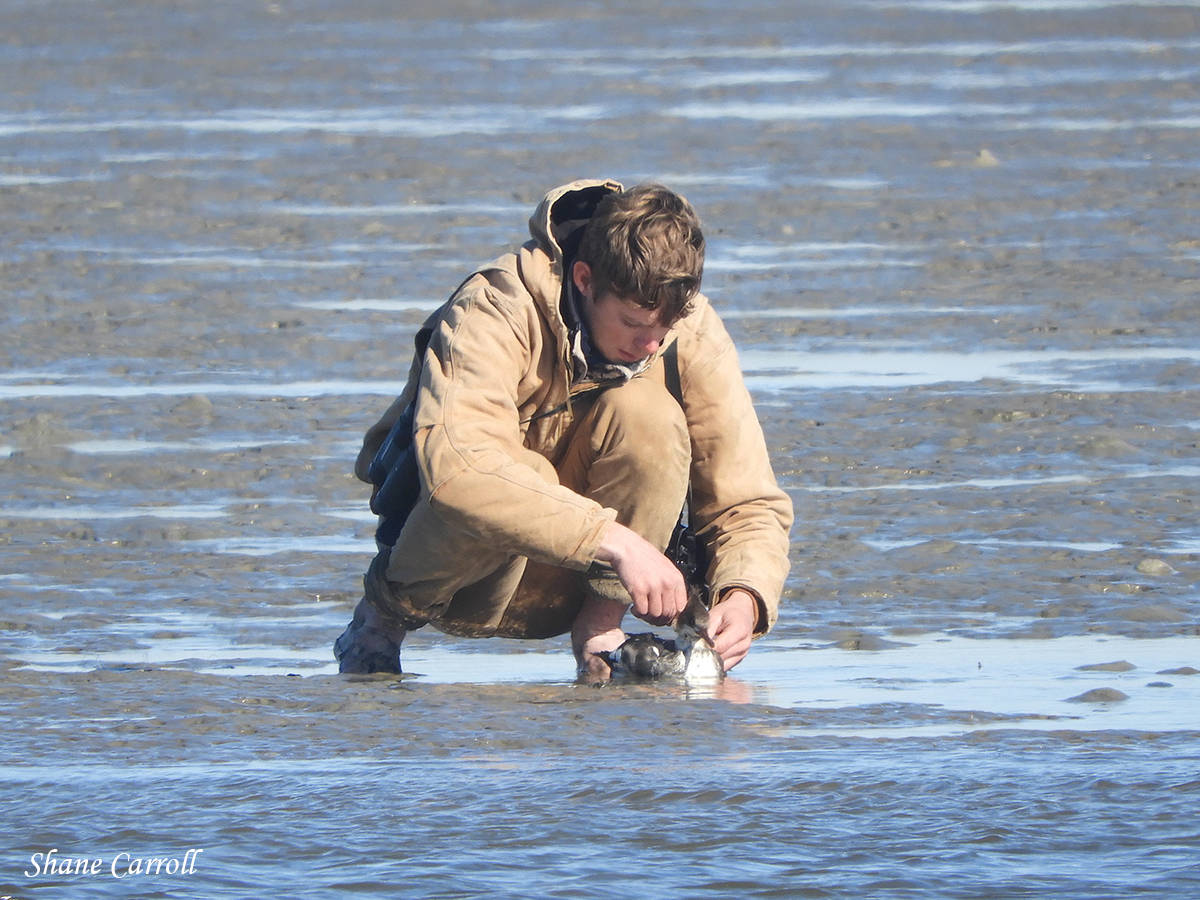 line. He then put his mouth to the line in an effort to cut it.
line. He then put his mouth to the line in an effort to cut it.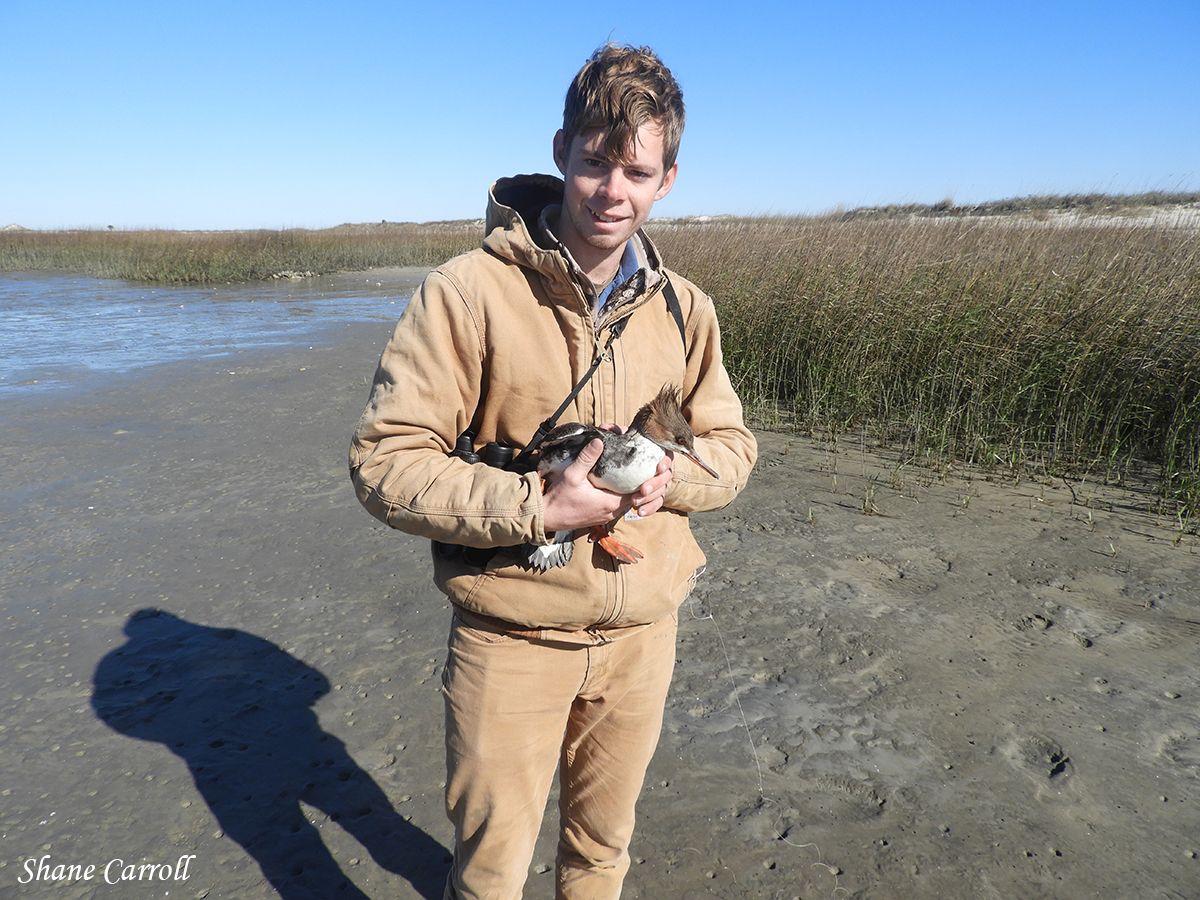 Alan Troyer of Tennessee was visiting Huguenot for the first time. He said he had left his pocketknife in the car so he was glad to see me. The last part of the fishing line was wrapped very tightly around the bird's neck and not visible. I felt through the so soft feathers to locate each twine that needed to be cut and once that last one was snipped the bird knew it and gave me just a few seconds to take this photo of Alan holding it."
Alan Troyer of Tennessee was visiting Huguenot for the first time. He said he had left his pocketknife in the car so he was glad to see me. The last part of the fishing line was wrapped very tightly around the bird's neck and not visible. I felt through the so soft feathers to locate each twine that needed to be cut and once that last one was snipped the bird knew it and gave me just a few seconds to take this photo of Alan holding it."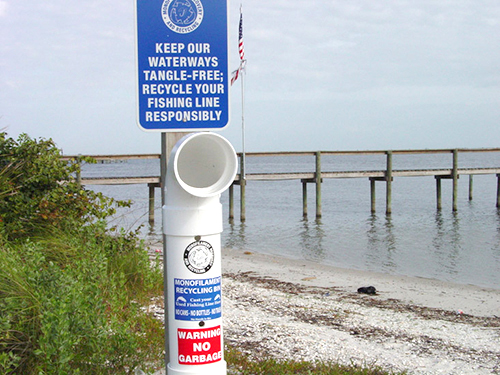 In an effort to reduce the environmental damage caused by discarded fishing line, Florida Fish and Wildlife Conservation Commission's
In an effort to reduce the environmental damage caused by discarded fishing line, Florida Fish and Wildlife Conservation Commission's 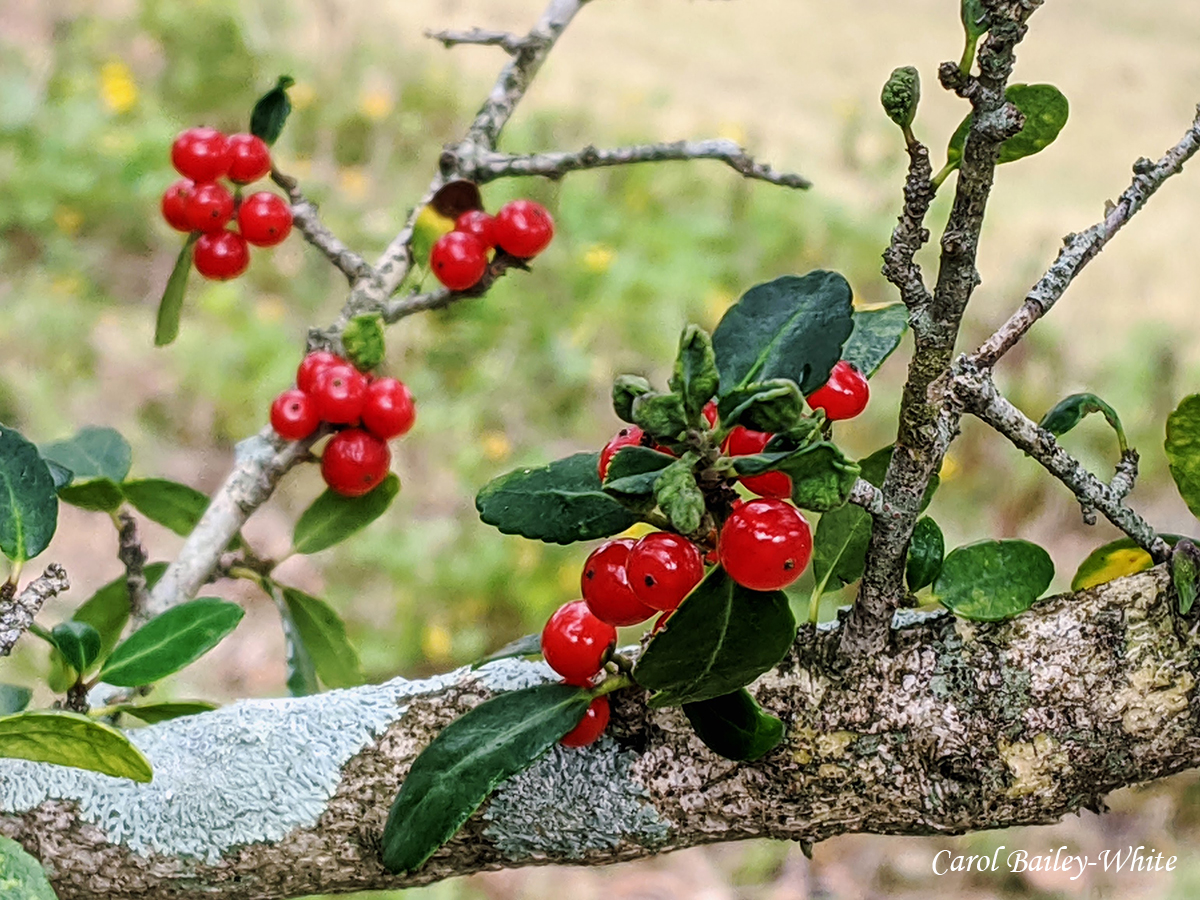 This is an evergreen shrub which can reach 25 to 30 feet in height and is one of the easiest wildlife plants for you to grow in your yard. Its native range is from coastal New Jersey south to Florida and west to Texas. It is one of the most adaptable plants available as it grows in sun to part shade, in a wide variety of habitats from moist to dry, and is salt tolerant. It requires no maintenance, is drought tolerant, and can be pruned or shaped if so desired. It has an attractive whitish bark with small evergreen leaves. It produces small inconspicuous white flowers in the spring which attract many insects; the lovely red berries are produced in the fall on female plants. The berries are beloved by a number of bird species, including: mockingbirds, bluebirds, sapsuckers, flickers, cedar waxwings, catbirds, robins, and white-throated sparrows.
This is an evergreen shrub which can reach 25 to 30 feet in height and is one of the easiest wildlife plants for you to grow in your yard. Its native range is from coastal New Jersey south to Florida and west to Texas. It is one of the most adaptable plants available as it grows in sun to part shade, in a wide variety of habitats from moist to dry, and is salt tolerant. It requires no maintenance, is drought tolerant, and can be pruned or shaped if so desired. It has an attractive whitish bark with small evergreen leaves. It produces small inconspicuous white flowers in the spring which attract many insects; the lovely red berries are produced in the fall on female plants. The berries are beloved by a number of bird species, including: mockingbirds, bluebirds, sapsuckers, flickers, cedar waxwings, catbirds, robins, and white-throated sparrows.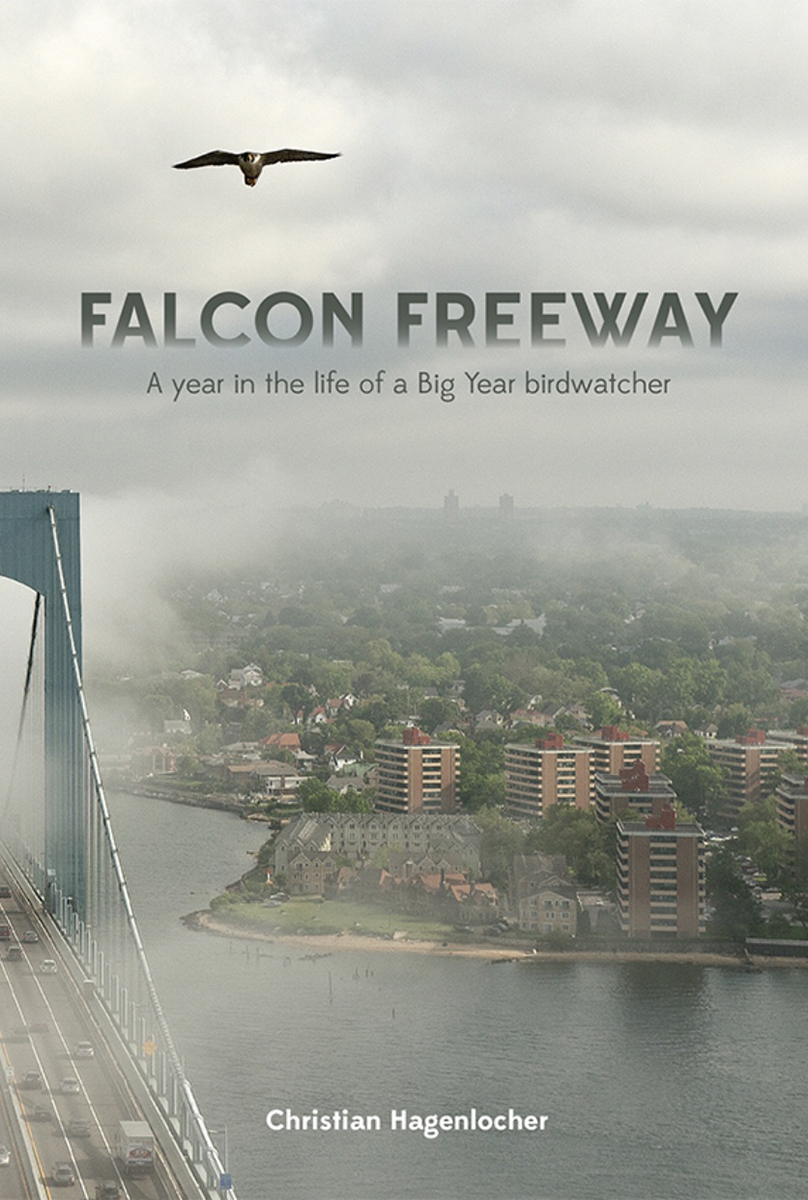 Christian is the youngest birder to see over 750 species of birds in North America. Falcon Freeway is more than just a chronicle of where Christian went and what birds he saw; he also takes us on his internal spiritual journey. He writes how his experiences and the people he met stimulated his growth as both a person and a birder. Christian’s descriptions of the natural world are lyrical at times; for example:
Christian is the youngest birder to see over 750 species of birds in North America. Falcon Freeway is more than just a chronicle of where Christian went and what birds he saw; he also takes us on his internal spiritual journey. He writes how his experiences and the people he met stimulated his growth as both a person and a birder. Christian’s descriptions of the natural world are lyrical at times; for example: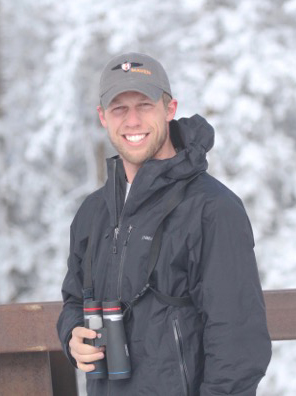 Christian had a unique approach to his Big Year. He did it on a budget; car-camping in Walmart parking lots and subsisting on fruit snacks and ramen noodles. Christian also focused on the birders he met as well as the birds he saw. He created a web page called
Christian had a unique approach to his Big Year. He did it on a budget; car-camping in Walmart parking lots and subsisting on fruit snacks and ramen noodles. Christian also focused on the birders he met as well as the birds he saw. He created a web page called